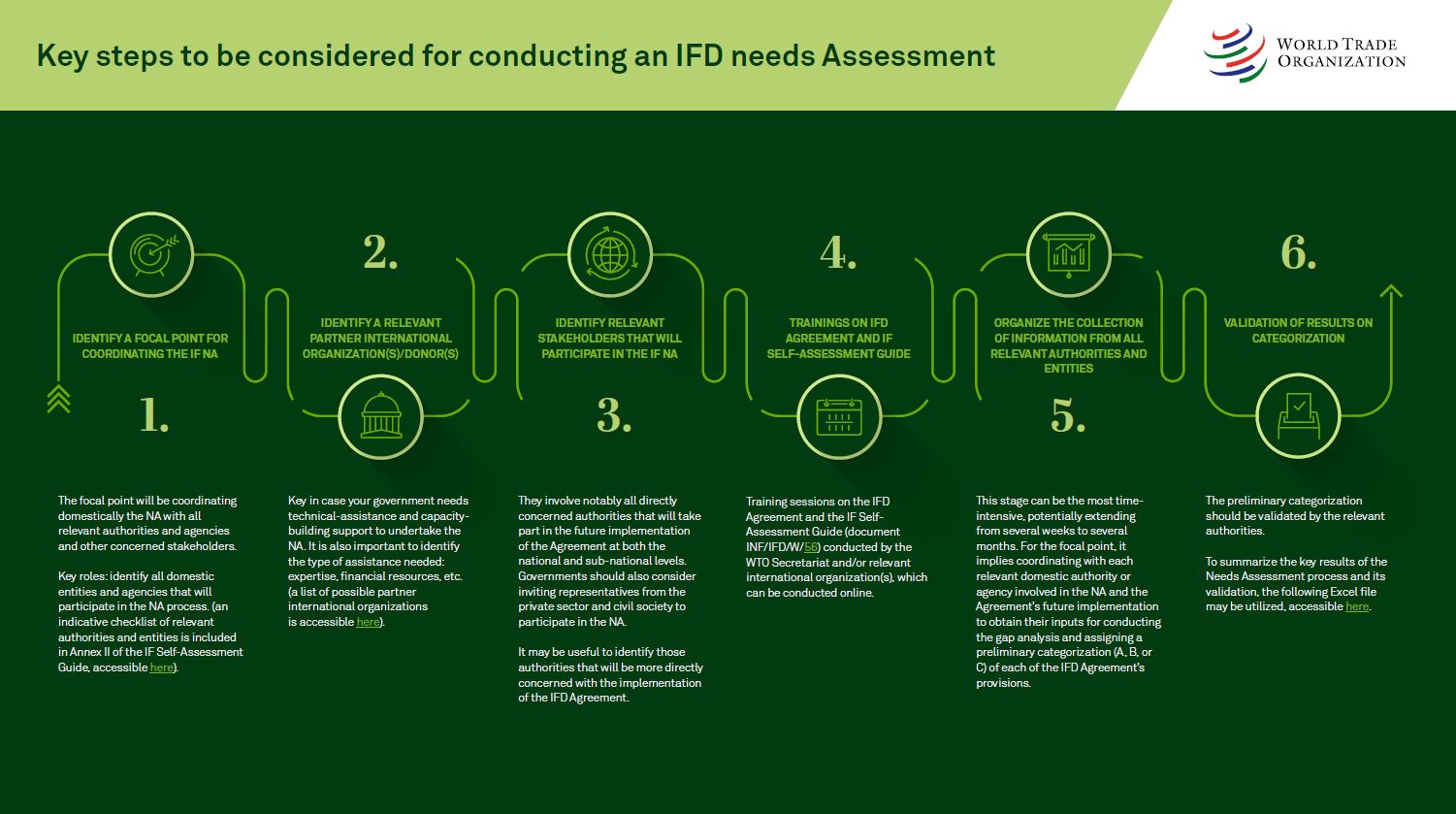- home
- Investment Facilitation for Development
- Investment facilitation needs assessment
IFD
Investment facilitation needs assessment
Needs assessments are aimed at helping developing and least-developed country (LDC) members get ready to implement the Investment Facilitation for Development Agreement.
Needs assessments are integral to the "special and differential treatment" (SDT) component of the IFD Agreement. These provisions allow developing and LDC members to self-designate the provisions of the Agreement under categories A, B, or C, based on their individual capacity to implement these provisions. To facilitate this process, developing and LDC members can undertake an IFD Needs Assessment (NA), a self-assessment to help them better ascertain their compliance levels and implementation needs, as outlined in Article 28.2 of the IFD Agreement.
The assessment helps members to determine the additional time they require for implementation of the Agreement as well as their needs for technical assistance and capacity-building support. Furthermore, the NA will also assist developing and LDC members in preparing notifications to be submitted to the WTO in order to benefit from the categorization of the Agreement's provisions.
IF needs assessments therefore assist developing and LDC members in:
- identifying possible gaps in their capacity to implement the Agreement's provisions;
- assessing their technical assistance and capacity-building support needs and priorities;
- categorizing the provisions of the IFD Agreement (into categories A, B and C) – it is for each member to determine the time needed to implement each provision and whether technical assistance and support for capacity building will be needed; and
- submitting the notifications required for making use of the SDT provisions of the IFD Agreement on categorization.
For all the above-mentioned reasons, the needs assessment process is a key mechanism to ensure that developing and LDC members can reap the full benefits of the IFD Agreement.
The SDT provisions of the IFD Agreement, which are inspired by the WTO's Trade Facilitation Agreement, allow developing and LDC members to "categorize" each substantive provision of the IFD Agreement. By so doing, members can determine the time needed to implement each provision and whether they will need technical assistance and capacity-building support for implementation. There are three categories of provisions (see Article 28 of the IFD Agreement):
- Category A: provisions that a developing member designates for implementation upon entry into force of the Agreement. For LDCs, within one year of the Agreement entering into force.
- Category B: provisions that a developing or LDC member designates for implementation after a transitional period of time after entry into force of the Agreement.
- Category C: provisions that a developing or LDC member designates for implementation after a transitional period of time and the provision of assistance and support for capacity building.
Key documents on IFD needs assessments
-
Investment Facilitation Self-Assessment Guide – INF/IFD/W/56 – 03/07/24
The Investment Facilitation Self-Assessment Guide is designed to assist developing and LDC members in conducting their needs assessments. Developed by seven partner international organizations (IDB, ITC, OECD, UNCTAD, UNECA, World Bank Group and WEF) under the coordination of the WTO Secretariat, the Guide includes the following components:
- Summary notes explaining each provision under categorization;
- Guiding questions to facilitate the self-assessment process under each provision; and
- Questionnaires and charts to help members identify their implementation gaps and categorize each provision (identify the time and support needed for implementation).
- Investment Facilitation Needs Assessment Checklist: Includes useful practical information for developing and LDC members wishing to start a needs assessment.
- Table Summarizing NA Results: Excel table aimed at helping members summarize the key results of their needs assessments.
- List of NA Projects: Includes a list of finalized and ongoing needs assessments in beneficiary members.
- List of Partner IO Contact Points in international organizations assisting developing and LDC members in undertaking IF needs assessments.



